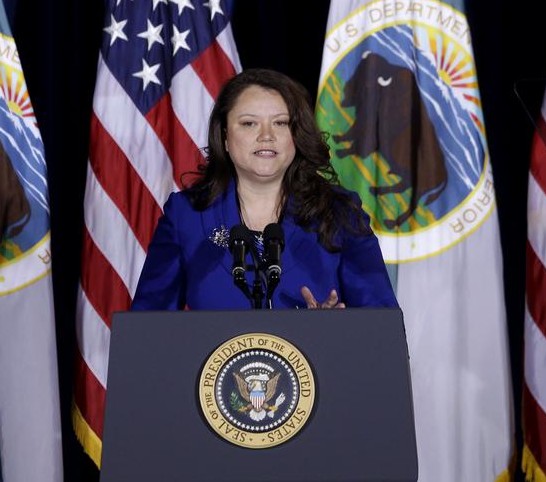Source: KBKW.com
Washington, D.C. – The Quinault government issued a white paper to the recently formed White House Council on Native American Affairs during its inaugural session in Washington, D.C. Tuesday. The Quinault paper, issued by Quinault President Fawn Sharp, responds to President Barack Obama’s directives to the new Council that it must work to facilitate “efficient delivery of government services” to Indian communities, and engage Indian and Native Alaskan governments for a “true and lasting government-to-government relationship.”
The document stated that the Quinault government “welcomes this opportunity to offer concrete comments and recommendations … that will strengthen the nation-to-nation relationship” and offered seven specific suggestions for success. It referred to the economic disaster of the last five and-a-half years that has undermined many tribal businesses across the country, and the sequestration of federal funding resulting in an “economic disaster among many tribes creating a profound sense of desperation in Indian Country.”
Commenting on the “chronic underfunding of Indian Country from federal agencies” starting with the Ronald Reagan Administration the Quinault government urged the new White House Council to send representatives to each tribe and Rancheria in the country to “engage in intergovernmental meetings.
According to President Sharp, the economic disaster of the last five and-a-half years has profoundly undermined many tribal businesses across the country, and the sequestration of federal funding resulting from the federal Budget Control Act will result in an economic disaster among many tribes, creating profound desperation in Indian Country in 2014 and 2015.
The White House Council should meet with each tribal government in the country. The purpose of these meetings would be to establish a dialogue with each tribal government to resolve the “disconnect and disparity between federal efforts to meet the needs of Indian Country and the actual on-the-ground needs.”
The Quinault government further urged formulation of federal agency policies based on “understanding current population characteristics, population growth data and the tribal economic environment.” President Sharp specifically urged the White House Council to share census and economic findings with each tribal government to ensure that tribal officials receive information to ensure their “free, prior and informed consent” to decisions that are made.
President Sharp specifically urged establishing funding levels on the basis of “qualified and quantified actual need” through a process of interagency cooperation, intergovernmental cooperation between tribal, state and federal governments, incentives to encourage public-private partnerships and expansion of tribal self-determination. The White House Council should document and assess “tribal government and community needs in terms of types of community needs quantified in terms of financial requirements for the next year and for the next three years,” said Sharp.
To strengthen the government-to-government relationship the Quinault statement to the White House Council called for the designation of representatives from the Department of State, Department of the Interior and the Department of Commerce joined by President Obama’s Senior Policy Advisor for Native American Affairs and Associate Director of Intergovernmental Affairs to enter into a dialogue with a Tribal Government Contact Group to discuss and negotiate a “framework for intergovernmental relations between tribal and federal governments.” The White House Council was also urged to recommend to President Obama the designation of a Special Counsel with the “authority of the President” to negotiate settlement of intergovernmental disputes between Indian nations and the United States government.
Clearly, my government welcomes the opportunity to offer concrete comments and recommendations to the White House Council on Native American Affairs as we enter another milestone in President Barack Obama’s commitment to strengthen the government-to-government relationship with Tribal Nations, said Sharp.
The new White House Council was established in a June 26, 2013 executive order by President Obama to improve coordination of federal programs and the use of resources available to tribal communities. It is chaired by the Secretary of the Interior, Sally Jewell, and is comprised of the heads of numerous federal executive departments and agencies. The council conducted a nationwide conference call Tuesday to help determine its mission and future activities, intended to strengthen the nation-to-nation relationship and facilitate the efficient delivery of government services.
If this new White House Council follows the right path, gets out of Washington D.C., works with the tribal nations on a true government-to-government basis and follows through on the need to work with us to find true solutions to our economic crises, we can and will make progress toward a better tomorrow,” said Sharp.
